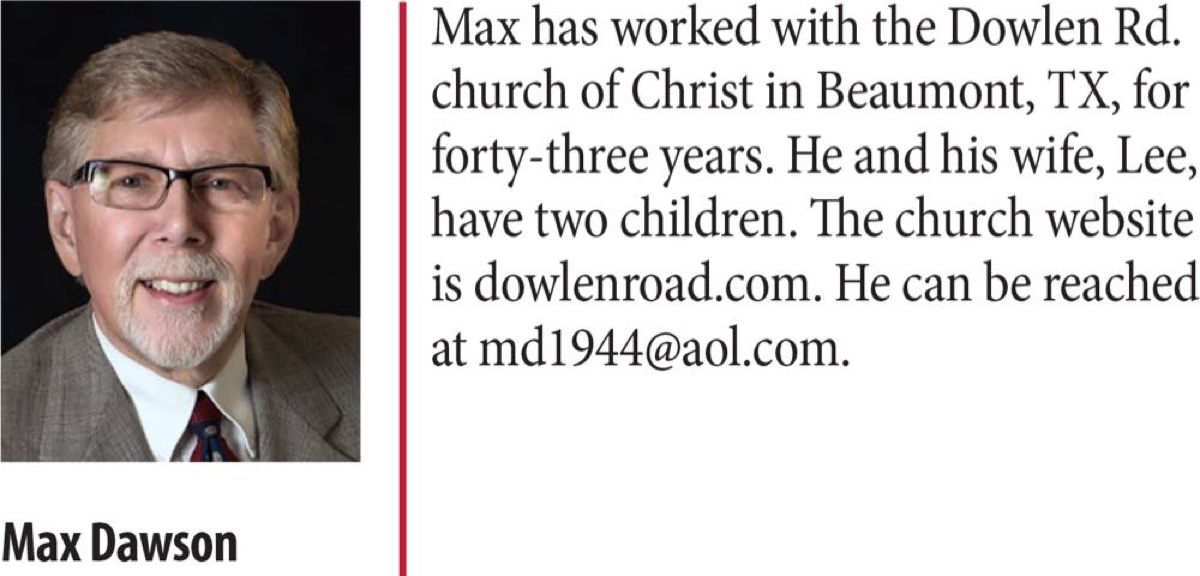By Max Dawson
Synopsis: In contrast with their cowardly companions, Joshua and Caleb stood alone, trusting in God and believing His promises. God’s anger burned against faithless Israel, but He blessed these two, saying, “they have followed the LORD fully” (Num. 32:10-12).
By definition, a remnant is that which is left or remains. It is typically set in contrast to a larger piece of the same material or substance. At the fabric store, my wife buys a remnant, a piece of cloth that remains when the main portion is gone.
Never was the concept of a remnant more clearly seen than in the case of Joshua and Caleb. They found themselves in the minority when Israel was afflicted with unbelief at Kadesh-Barnea. While most of Israel was gone, Joshua and Caleb remained faithful to God.
As Israel neared the land of Canaan, twelve spies were sent into the promised land. Numbers 13:1-33 recounts the forty days’ journey that the spies made into the land, as well as their return, when they offered two reports about the land. The majority report can be summarized in one sentence: “We are not able to take the land.” The minority report stood in stark contrast as Caleb said, “Let us go up at once and take possession, for we are well able to overcome it.”
Caleb and Joshua found themselves in the minority, not only among the spies, but also in contrast to the whole nation of Israel. Numbers 14:1 indicates that all the congregation wept that night because of the report of the ten spies. No amount of persuading by Joshua, Caleb, Moses, or Aaron would turn the people from their rebellion (Num. 14:1-10). The congregation of Israel went so far as to want to kill God’s leaders.
Joshua and Caleb can be identified as “the first remnant.” They, along with a few others, did not rebel against the Lord.
There are two kinds of leaders in this story: (1) There are those who believe that, with God’s help, they could be successful in doing His will and realizing His promises. (2) Then, there are those who, motivated by fear rather than faith, believed they would fail.
What should godly leaders do when they find themselves in the minority? If you are a leader among God’s people today, it may happen to you, just like it did to so many faithful leaders chronicled in the Bible story. Think of Moses, David, Jeremiah, Jesus, and Paul.
Here are four things to do when you are in the minority, part of that remnant that is faithful to God.
Don’t assume that you are standing for truth just because others may oppose you. Caleb and Joshua were indeed right. God had told them that the land of Canaan would be theirs (Num. 14:8). Abraham Lincoln said, “Be sure you are right, and then go ahead.” Good advice.
God had promised that land to Abraham’s descendants more than 400 years earlier (Gen. 12:7). All that happened in the Bible story up to Joshua and Caleb’s time was looking forward to that great moment when—with the help of God—they would take the Promised Land. God’s plan was still alive and well, even though the Israelites rebelled. God’s plan might be delayed for forty years, but it would not be stopped.
Sometimes things will not go in the way (or in the time) you think they should, and you may be right in your thinking. However, don’t give up! God’s work must continue, and it is not all about you or me and the things that we think should happen. We do what we can with the time and opportunities afforded to each of us, but we don’t give up.
Maybe this is part of keeping the big picture in mind, but it is more than that. It is about faith. Joshua and Caleb believed God would make good on His promise. The ten spies who gave the faithless report did not once mention God. Their report was all about how “we are not able.” They were thinking of their own strength. They said of the people of Canaan, “They are stronger than we” (Num. 13:31).
Joshua and Caleb said, “We are well able” (Num. 13:30). When they said that, they were not thinking about their own strength, but of God and His power. In Numbers 13:8-9, they spoke words of faith when they said, “He will bring us into this land” and “The Lord is with us. Do not fear them.”
Have we forgotten that it is the all-powerful God whom we serve? Indeed, we might find ourselves in the minority when we have faith and others do not. It is precisely in such times when we must remind others of God’s power. We are people of faith. We look at every situation in the light of God and His ability.
Look at the spirit of Caleb in Numbers 14:24. God was going to bring him into the land and his descendants would inherit it. Why? God said “. . .because he has a different spirit in him and has followed Me fully. . . .” Caleb was obedient to God while others were not. Caleb maintained an optimistic can-do spirit while others faltered. The word “spirit” in this text has to do with Caleb’s attitude or disposition. He had a positive outlook, a view of God and His promises that believed in the success of what God called him to do!
We can be like Caleb. Even though we are in a minority, we can still maintain an optimistic spirit. We can be obedient to God and follow Him fully, even when others do not. It has a lot to do with our disposition!
Those other spies—along with their generation—were not allowed to inherit the land of Canaan. God turned them back not only to wander in the wilderness but also to die in it. Listen to Numbers 14:29: “The carcasses of you who have complained against Me shall fall in this wilderness, all of you who were numbered, according to your entire number, from twenty years old and above.”
What about Joshua and Caleb? See the next verse: “Except for Caleb the son of Jephunneh and Joshua the son of Nun, you shall by no means enter the land which I swore I would make you dwell in” (Num. 14:30). None of that generation would be allowed to inherit the land. . . except for Caleb and Joshua! Indeed, they did inherit the land. The book of Joshua chronicles their conquest of Canaan.
One more thing to note. In Joshua 14:6-15, some forty-five years have passed since that incident at Kadesh-barnea. Caleb is now eighty-five years old. Moses had sworn that the land Caleb had walked on when he spied out Canaan would be his. Joshua honored what Moses promised and gave Hebron to Caleb. However, the Anakim were in that land, but Caleb was ready to take them on! He said, “I am as strong this day as on the day that Moses sent me; just as my strength was then, so now is my strength for war, both for going out and for coming in.” Caleb, the aged giant-killer! Caleb was now doing what God wanted him to do all along—take the land!
We can draw an important lesson from Caleb’s life. Doing right eventually vindicates the righteous. At the spying incident, Caleb both spoke and did what was right. He was hated for it, but his continued loyalty, obedience, and trust in God eventually vindicated him. The same can be true of us, even if we are numbered in the minority.


